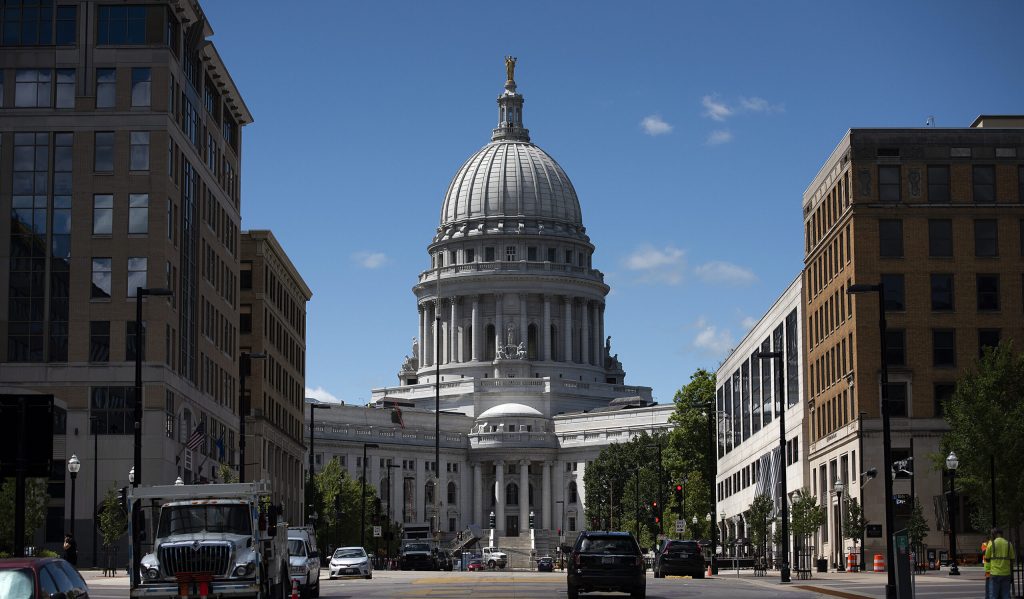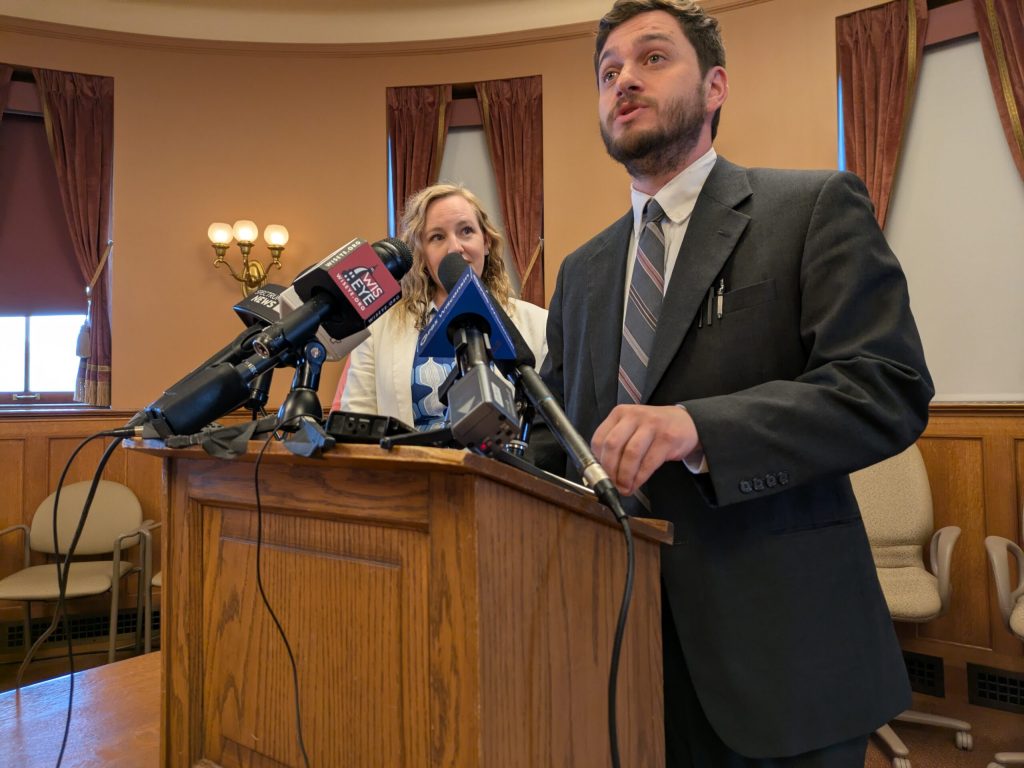Bill to Expand Wisconsin’s Nuclear Power Heads to Gov. Evers’ Desk
Another bill passed makes it easier for political candidates to withdraw their name from a ballot.

Wisconsin State Capitol. Angela Major/WPR
The state Assembly passed a set of bills Tuesday that would expand nuclear power in Wisconsin, sending the plans to Gov. Tony Evers’ desk.
They also approved a bill that would make it easier for political candidates to remove themselves from ballots — a direct response to the efforts of Robert F. Kennedy Jr. to drop off the ballot in Wisconsin in last year’s presidential race after the deadline.
The debate took place in the shadow of another looming deadline, with Wisconsin’s state budget increasingly unlikely to pass the Legislature before the end of the fiscal year July 1. Lawmakers repeatedly alluded to the time crunch as they debated the funding of several dozen bills.
One of the nuclear power bills would establish a board to host a summit in Madison in an effort to transform Wisconsin into an industry leader. Another would mandate a study into where more nuclear power plants could be established in the state.
Rep. Shae Sortwell, R-Two Rivers, who has led the push to promote nuclear power in Wisconsin, said it would bring clean energy and union jobs to Wisconsin.
“It’s the difference between the Flintstones technology and the Jetsons. It’s that advanced,” he said. “The nuclear renaissance is upon us here in Wisconsin and in the United States, and it’s time for everybody else to get on board.”
Some Democrats, including Rep. Supreme Moore Omokunde, D-Milwaukee, said they supported the goals of expanding nuclear power but were concerned that the Legislature would be careless when siting new plants.
“I bet if we went door-to-door in our districts today, I can almost guarantee that no one is going to want a nuclear plant sited in their backyard for health concerns, for property value concerns. We need to have the conversation first,” he said. “This bill is a very cart-before-the-horse perspective.”
Lawmakers also approved a bipartisan joint resolution affirming a legislative commitment to expanding nuclear power. The resolution calls nuclear and fusion energy “clean energy sources that are critical to safely meeting Wisconsin’s growing energy demands,” and avows that the state is committed to growing out that industry.
Responding to RFK Jr’s 2024 candidacy
The bill responding to Kennedy would create a new process for candidates to remove their names from ballots after the deadline to do so has passed.
Currently, state law says that anyone who properly files nomination papers cannot then decline to appear on a ballot. As written, the bill would give a person the ability to withdraw if they file a sworn statement by the deadline for the Wisconsin Elections Commission to certify all candidates.
A statewide or national candidate would also have to pay a fee of $1,000, and a local candidate would have to pay $250.
It was proposed after Kennedy, who is now the United States Secretary of Health and Human Services, ran for president as an independent last year before suspending his campaign in August and endorsing President Donald Trump.
Despite his candidacy’s end, Kennedy remained on the ballots in some states, including Wisconsin, where election officials found that state law does not allow a candidate who properly files nomination papers to decline to appear on the ballot, unless they die. Kennedy sued unsuccessfully to remove his name, arguing that independent candidates are held to more stringent deadlines than Republican or Democratic candidates.
At the time, he expressed concern that his presence would serve as a spoiler to Trump’s campaign, pulling conservative voters away from the Republican candidate.
Democrats say ‘show me the money’
Lawmakers took up dozens of other proposals Tuesday, many of which proposed policy changes that would require state funding but came with none attached.
That’s become a recent strategy of Republicans in response to Gov. Tony Evers’ use of his partial veto powers two years ago to cross out numbers in such a way that he extended school funding for 400 years, up from the two years that Republicans had approved.
After the Wisconsin Supreme Court upheld that use of the veto powers, Republicans said they’d be more careful about including numbers in their bills going forward. In the Senate last week, GOP lawmakers said Evers had breached trust necessary in divided government. Democrats responded that they, likewise, could not trust their colleagues to eventually release funds to support the policies being passed.
That argument reached the Assembly Tuesday along with a package of bills already passed by the Senate, boiling over during a debate over a bipartisan bill to expand residential mental healthcare for young people. Democrats repeatedly, and unsuccessfully, introduced amendments that would attach funding that policy, with some repeating a famous line from the 1996 movie “Jerry Maguire”: “Show me the money.”
“Without funding, the bill is a hollow shell,” said Rep. Andrew Hysell, D-Sun Prairie. “Some of our state’s most vulnerable children truly need what this bill could provide if actually funded, but the bill has no funding, which renders it meaningless.”
Rep. Pat Snyder, R-Weston, accused Democrats of fearmongering, saying Republicans would establish funding later for the bills they support.
“I don’t appreciate scare tactics like that,” he said. “Let’s work on getting the foundation built and then finding out the cost and fund it.”
The debate spilled over into other bills, including one to establish grants for recruiting families to Wisconsin, and another to offer hearing protection to law enforcement.
Rep. Tip McGuire, D-Kenosha, sits on the Legislature’s Joint Finance Committee, which has reached a standstill in recent days as Senate and Assembly Republicans differ over details in the budget bill.
McGuire argued that, with the fiscal year ending in a week, lawmakers were setting themselves up to approve unfunded mandates heading into a period of economic uncertainty for the state.
“I am concerned about the lack of funding, and frankly, the way that this has set the stage for a very bizarre budget,” he said, adding that not attaching dollars to bills “creates the risk of these things never getting funded, because we’ve seen a budget process that has broken down in so many ways.”

Rep. Tip McGuire, D-Kenosha, and Sen. Kelda Roys, D-Madison, speak to reporters at the Wisconsin Capitol on June 10, 2025. Shawn Johnson/WPR
Republicans largely did not respond to those arguments, besides voting to approve the proposals themselves.
Referring to another bill related to children’s safety plans, Rep. Amanda Nedweski, R-Pleasant Prairie, said Democrats would have the opportunity to later approve the state budget.
“For all those people here today saying they can’t vote for the bill because it’s not funded, well, I’m looking forward to your yes vote on the bill that does fund this program,” she said.
Legislation to expand Wisconsin’s nuclear power heads to Gov. Tony Evers’ desk was originally published by Wisconsin Public Radio.
If you think stories like this are important, become a member of Urban Milwaukee and help support real, independent journalism. Plus you get some cool added benefits.




















